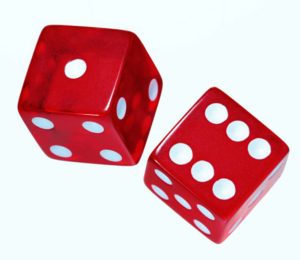If you don’t like taking risks, this article is for you. Maybe you are shy and worried about embarrassment, or you are competitive and afraid to look like you don’t know what you are doing. Perhaps you are risk-averse professionally, as a lawyer or accountant, for example.
There’s good and bad news for you. First, the bad news: Learning and playing music is risky! Not only is it likely that you’ll make bad sounds, hit wrong notes, and forget something you thought you learned — all in front of other people — but these “mistakes” are the only pathway to learning an instrument.
Now here’s the good news: Playing music is a very low-stakes gamble. Hitting a wrong note or a bad sound is not life-threatening, nor (contrary to some people’s fears) will it wreck your reputation.
Too often, learners derail themselves, and slow down or even prevent learning, by taking out precious time to berate themselves or apologize for making a “mistake”. I put “mistake” in quotes because hitting a wrong note or string, or squeaking, or doing anything you didn’t intend to do, is not a mistake. What you might call a mistake is really like a symptom; it reveals something you don’t yet understand, or something you didn’t prioritize because you’re busy taking care of something else. Imagine if every time you went to a doctor you took a bunch of drugs so that you showed no symptoms. There’d be nothing to fix! Then you’d get home and start feeling miserable, with no doctor there to help.
If you missed a note, or squeaked, or misplaced a bowing, did you notice if that happened there before? If not, it was a fluke, so why worry? If it has happened in the same place before, it may be a flaw worth attending to, so do you know which phrase was it in? Is it part of a pattern that is similar to another place in the tune? Rarely is a note missed in isolation; it is usually missed because of its relationship to the note(s) before or after. It could have been missed because the bow felt awkward getting to it, and might not be the finger’s fault at all. The point is, there are so many possible interesting angles to the puzzle that you really have no time to go pretending you “should have” got it right. That won’t fool anyone, including your teacher — or yourself!
Anybody who has gone through the process of learning an instrument, for any length of time, knows about “mistakes”. If you make one in front of them, not only are they not likely to care, they may not even notice, and if they do, they are more likely to be totally understanding toward you than to criticize (unlike some situations in the actually-risky parts of life!).
People who are driven to succeed tend to think they can drill, memorize and practice until perfect. I’m not sure these are very efficient ways to learn (at least not according to the latest cognitive science) but they can lead to successes in some areas such as math or the law. In music, these strategies of being “prepared” don’t actually help you enjoy playing with or for other people. That’s because music needs you to develop performance skills, skills that are physical and anchored in time, skills that can’t be fully honed in isolation. It’s not even possible to get everything “correct” in music, because there’s no clear definition of what “correct” means. Playing with good timing, getting a good sound, playing in tune — these are all skills that are only meaningful in relation to the phrasing, the tune, the moment, the mood, the company you’re in.
Risks must be taken in order to learn, but they’re fun risks! Nobody minds mistakes when the intentions are good and you’re trying to contribute to a group sound, or trying to convey a good tune. This means that in the end, you just can’t take yourself too seriously. You can’t afford to focus on yourself at the expense of others. The group sound, in a session or band, is more important than the individual. I like to say, “it’s better to be together than to be correct.” In fact, focusing too much on yourself is the recipe for stagefright — a previous article speaks about this and how to avoid it.
Play with others and take the risks! And as you do, be sensitive to the sound of the other players, so that you can really learn and improve. Thinking only about whether you’re getting the right notes will not help you improve; always try to pay attention to how you can contribute to the group sound. Keep in time even if you skip notes. Back off if people play a quiet tune. If people play a tune you don’t know, listen and allow others to enjoy their tune. They’ll soon enjoy hearing your tune or helping you by playing with you.
Music flows in time, like a river in its banks. “Mistakes” are like water under the bridge. Make a mental sticky note about them if you can, observe and learn, but above all, move on with the river, and enjoy the process!
©2019 Ed Pearlman